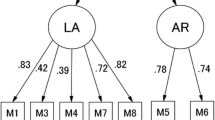Summary
The emotions and attitudes of mothers towards their infants are crucial for the child’s well-being and development. Some mothers experience a delay in the onset of maternal affection after childbirth and occasionally a longer lasting failure to bond will ensue. Little is known about the precise prevalence of these difficulties, how they relate to maternal mental health, how they develop over time and what their biological and psychosocial correlates are. In research studies the mother-infant relationship has traditionally been assessed using observational methods but these are time consuming and not suited for screening in clinical practice. Two self-rating instruments have recently been developed to assess maternal bonding. Both can be used in large samples of recently delivered mothers including those suspected to be at high risk of bonding disorders. In this study, the psychometric properties of the 8-item Mother-to-Infant Bonding Scale (MIB) and the 25-item screening questionnaire for mother–infant bonding disorders, namely the Postpartum Bonding Questionnaire (PBQ), were examined in a sample of first-time mothers in order to establish their reliability and validity. Ninety-six women completed the MIB, PBQ and the Kennerley Blues Scale on day 2–4 postpartum. Both bonding instruments demonstrated acceptable reliability and reasonable validity, with the exception of the PBQ subscale of risk of abuse.
Similar content being viewed by others
References
Ainsworth MDS, Blehar MC, Waters E, Wall S (1978) Patterns of attachment: a psychological study of the strange situation. Erlbaum Hillsdale, NJ
J Bowlby (1958) ArticleTitleThe nature of the child’s tie to his mother Int J Psycho-Analysis 39 350–373 Occurrence Handle1:STN:280:DyaG1M%2FktVSgtw%3D%3D
IF Brockington (2004) ArticleTitlePostpartum psychiatric disorders Lancet 363 303–310 Occurrence Handle14751705 Occurrence Handle10.1016/S0140-6736(03)15390-1
IF Brockington R Kumar (1982) Motherhood and mental illness Oxford University Press Oxford
IF Brockington J Oates S George D Turner M Vostanis M Sullivan C Loh C Murdoch (2001) ArticleTitleA screening questionnaire for mother–infant bonding disorders Arch Womens Menl Health 3 133–140 Occurrence Handle10.1007/s007370170010
JL Cox JM Holden R Sagovsky (1997) ArticleTitleDetection of postnatal depression: development of the 10-item Edinburgh Postnatal Depression Scale Br J Psychiatry 150 782–786
Crittenden PM (2001) CARE-INDEX Infants and Toddlers. Coding Manual. Family Relations Institute, Miami, USA
PM Crittenden MDS Ainsworth (1989) Child maltreatment and attachment theory D Ciccetti V Carlson (Eds) Handbook of child maltreatment Cambridge University Press New York
T Deale (2005) ArticleTitleAssociations between child development and women’s attitudes to pregnancy and motherhood J Reprod Infant Psychol 23 63–75 Occurrence Handle10.1080/02646830512331330938
V Glover P Liddle A Taylor D Adams M Sandler (1994) ArticleTitleMild hypomania (the highs) can be a feature of the first postpartum week: association with later depression Br J Psychiatry 164 517–521 Occurrence Handle8038942 Occurrence Handle1:STN:280:DyaK2czhtlegtg%3D%3D
H Kennerley D Gath (1989) ArticleTitleMaternity Blues: detection and measurement by questionnaire Br J Psychiatry 155 356–362 Occurrence Handle2611547 Occurrence Handle1:STN:280:DyaK3c7itlKltg%3D%3D
R Kumar IF Brockington (1988) Motherhood and mental illness: causes and consequences Oxford University Press Oxford
RC Kumar (1997) ArticleTitle“Anybody’s child”: severe disorders of mother-to-infant bonding Br J Psychiatry 171 175–181 Occurrence Handle9337956 Occurrence Handle1:STN:280:DyaK2svnvFejtg%3D%3D Occurrence Handle10.1192/bjp.171.2.175
JA MacFarlane DM Smith DH Garrow (1978) The relationship between mother and neonate S Kitzinger JA Davis (Eds) The place of birth Oxford University Press New York
L Murray C Stanley R Hooper F King A Fiori-Cowley (1996) ArticleTitleThe role of infant factors in postnatal depression and mother–infant interactions Dev Med Child Neurol 38 109–119 Occurrence Handle8603778 Occurrence Handle1:STN:280:DyaK287otF2guw%3D%3D Occurrence Handle10.1111/j.1469-8749.1996.tb12082.x
KM Robson R Kumar (1980) ArticleTitleDelayed onset of maternal affection after childbirth Br J Psychiatry 136 347–353 Occurrence Handle7388242 Occurrence Handle1:STN:280:DyaL3c3itFKgsw%3D%3D Occurrence Handle10.1192/bjp.136.4.347
KM Robson E Powell (1982) Early maternal attachment IF Brockington R Kumar (Eds) Motherhood and mental illness Oxford University Press Oxford
DL Streiner GR Norman (1995) Health measurement scales EditionNumber2 SeriesTitleA practical guide to their development and use Oxford University Press Oxford
A Taylor R Atkins R Kumar D Adams V Glover (2005) ArticleTitleA new Mother-to-Infant Bonding Scale: links with early maternal mood Arch Womens Ment Health 8 45–51 Occurrence Handle15868385 Occurrence Handle10.1007/s00737-005-0074-z Occurrence Handle1:STN:280:DC%2BD2M3msFKguw%3D%3D
Author information
Authors and Affiliations
Rights and permissions
About this article
Cite this article
Wittkowski, A., Wieck, A. & Mann, S. An evaluation of two bonding questionnaires: a comparison of the Mother-to-Infant Bonding Scale with the Postpartum Bonding Questionnaire in a sample of primiparous mothers. Arch Womens Ment Health 10, 171–175 (2007). https://doi.org/10.1007/s00737-007-0191-y
Received:
Accepted:
Published:
Issue Date:
DOI: https://doi.org/10.1007/s00737-007-0191-y



